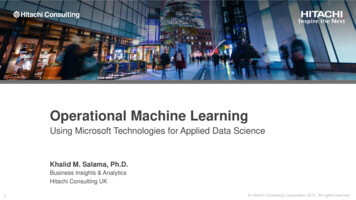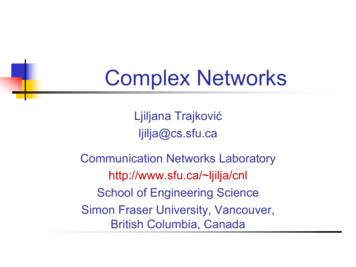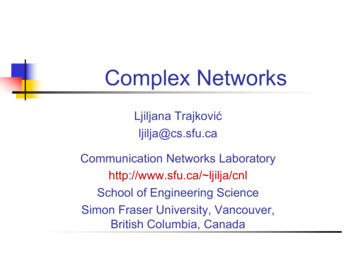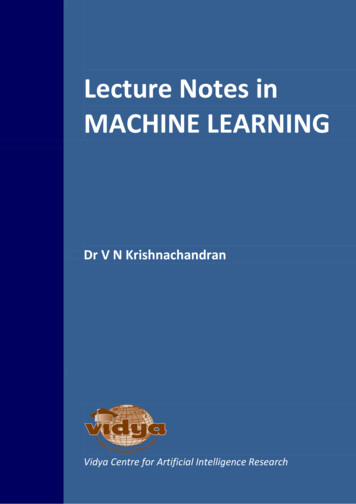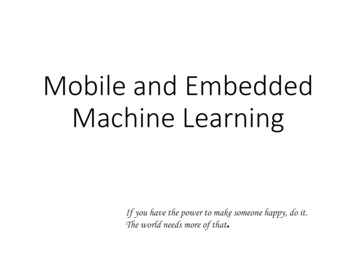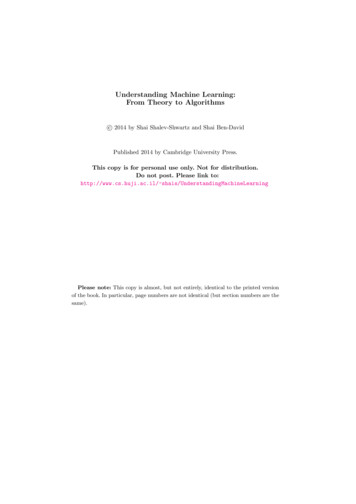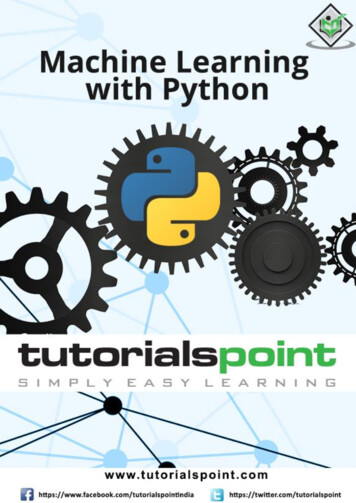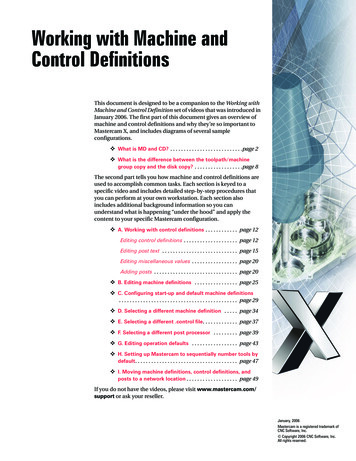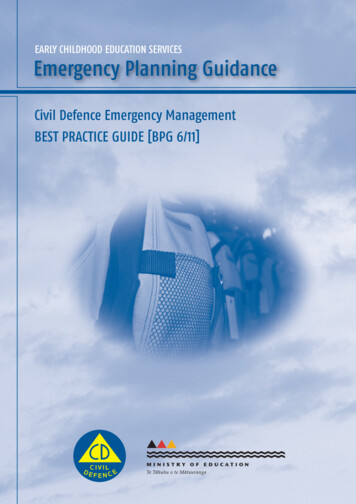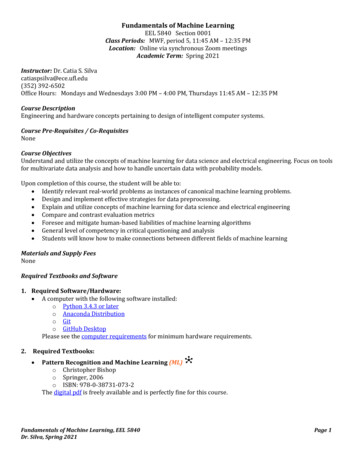
Transcription
Fundamentals of Machine LearningEEL 5840 Section 0001Class Periods: MWF, period 5, 11:45 AM – 12:35 PMLocation: Online via synchronous Zoom meetingsAcademic Term: Spring 2021Instructor: Dr. Catia S. Silvacatiaspsilva@ece.ufl.edu(352) 392-6502Office Hours: Mondays and Wednesdays 3:00 PM – 4:00 PM, Thursdays 11:45 AM – 12:35 PMCourse DescriptionEngineering and hardware concepts pertaining to design of intelligent computer systems.Course Pre-Requisites / Co-RequisitesNoneCourse ObjectivesUnderstand and utilize the concepts of machine learning for data science and electrical engineering. Focus on toolsfor multivariate data analysis and how to handle uncertain data with probability models.Upon completion of this course, the student will be able to: Identify relevant real-world problems as instances of canonical machine learning problems. Design and implement effective strategies for data preprocessing. Explain and utilize concepts of machine learning for data science and electrical engineering Compare and contrast evaluation metrics Foresee and mitigate human-based liabilities of machine learning algorithms General level of competency in critical questioning and analysis Students will know how to make connections between different fields of machine learningMaterials and Supply FeesNoneRequired Textbooks and Software1. Required Software/Hardware: A computer with the following software installed:o Python 3.4.3 or latero Anaconda Distributiono Gito GitHub DesktopPlease see the computer requirements for minimum hardware requirements.2.Required Textbooks: Pattern Recognition and Machine Learning (ML)o Christopher Bishopo Springer, 2006o ISBN: 978-0-38731-073-2The digital pdf is freely available and is perfectly fine for this course.Fundamentals of Machine Learning, EEL 5840Dr. Silva, Spring 2021Page 1
Recommended Materials Introduction to Machine Learning (IML)o Ethem Alpaydino 3rd editiono The MIT Press, 2014o ISBN: 978-8-120-35078-6This book is freely available online via Course Reserves (you can easily access it under the “CourseReserves” tab in our Canvas page) Deep Learning (DL)o Ian GoodFellow, Yoshua Bengio and Aaron Courvilleo MIT Press, 2016o ISBN: 978-0-262-03561-3The online book is freely available online and is perfectly fine for this course. Python Data Science Handbook – Essential Tools for Working with Data (PDS)o Jake VanderPlaso O’Reilly Media, 2016o ISBN: 978-1-491-91205-8The online book is freely available and is perfectly fine for this course Python Machine Learning (PML)o Sebastian Raschka and Vahid Mirjalilio 2nd editiono Packt Publishing, 2017o ISBN: 978-1-787-12602-2This book is freely available online via Course Reserves (you can easily access it under the “CourseReserves” tab in our Canvas page) A Whirlwind Tour of Python (WP)o Jake VanderPlaso O’Reilly Media, 2016o ISBN: 978-1-491-96465-1The online book is freely available and is perfectly fine for this courseAll textbooks are listed and available online through Course Reserves. You can also find this informationunder the icon “Course Reserves” in our Canvas page.Course ScheduleThe following schedule is tentative and may vary due to time constraints.Video: refers to short ( 20 min) recordings to watch as a preparation or supplement of lectureL.ModuleDayTopic/sReading Materials#1. Introductionto MachineLearning1M,01/11 What is Machine Learning?Introduction to Git and Jupyter Notebooks(video) Introduction to Python: NumPy,Matplotlib, PandasInstall: git, GitHubDesktop, Python, Anaconda,nbextensionsDL: C-1WP: S-3, S-4, S-5PDS: C-1, C-2, C-3, C-4Fundamentals of Machine Learning, EEL 5840Dr. Silva, Spring 2021Page 2
W,01/13 Types of learningIntroduction to Supervised Learning3F,01/15 (Linear) Regression--M,01/184W,01/202PML: C-1IML: C-1, C-2ML: S-1.1PDS: S-5.6Martin Luther King Jr. Day ML: S-1.3Model selection; Occam’s RazorGeneralizationIML: S-2.7PDS: S-5.32. ExperimentalDesign andAnalysis The Curse of DimensionalityML: S-1.4 The No Free Lunch TheoremRegularizationIML: S-19.1W,01/27 Linear Basis FunctionsThe Bias-Variance Trade-Off8F,01/29 Experimental DesignHyperparameter tuning; Cross-validation9M,02/01 Maximum Likelihood Estimation (MLE)W,02/03 5673. BayesianLearning4. GenerativeClassificationF,01/22M,01/2510ML: S-3.1, S-3.2, S-3.6DL: S-5.4IML: S-19.2 – S-19.6ML: C-2, S-3.3DL: S-5.5ML: S-3.4Maximum A Posteriori (MAP)DL: S-5.6ML: S-3.511F,02/05 Bayesian Prior Equivalence12M,02/08 Introduction to ClassificationProbabilistic Generative Models13W,02/10IML: C-3, S-4.1, S-4.2, S4.3, S-4.4DL: S-5.7ML: S-4.2 Naïve Bayes Classifier4.814F,02/12 Mixture ModelsExpectation-Maximization (EM) Algorithm15M,02/15 Gaussian Mixture Models1617–18W,02/17F,02/19M,02/22IML: S-4.5, S-4.6, S-4.7, SML: S-2.3.9, S-9.2ML: S-9.3, S-9.4PDS: S-5.12 Evaluation MetricsFundamentals of Machine Learning, EEL 5840Dr. Silva, Spring 2021IML: S-19.7 – S-19.14Final Project DiscussionMidterm Exam ReviewPage 3
19W,02/24 Hipergator help sessionConnect to: jhub, help &documentationComplete (mandatory):Hipergator account trainingCovers modules 1-4 (Lect. # 1-18)Midterm Exam (tentative): Thursday, February 25, 2021 @ 4:00 PM – 6:00 PM5. NonparametricLearningF,02/26 ClusteringK-Means Clustering21M,03/01 Cluster Validity Metrics22W,03/03 K-Nearest NeighborsF,03/05 M,03/08 W,03/10 26F,03/12 Logistic DiscriminationIML: S-10.7, S-10.827M,03/15 Kernel MachineLagrange MultipliersML: Appendix EW,03/17 Support Vector Machine (SVM)F,03/19 Kernel trickSlack variables30M,03/22 Dimensionality ReductionFeature 24257. KernelMachine28298.DimensionalityReduction andManifoldLearningML: S-9.120PDS: S-5.11PML: C-11ML: S-2.5IML: S-8.1 – S.8.5Discriminant FunctionsML: S-4.1IML: S-10.1, S-10.2Linear Discriminant FunctionsML: S-4.1IML: S-10.3 – S-10.5The Perceptron AlgorithmML: S-4.1IML: S-10.6IML: S-13.1ML: S-7.1IML: S-13.2, S-13.3IML: S-13.4 – S-13.9PDS: S-5.7IML: S-6.1, S-6.2ML: S-12.1 Principal Component Analysis (PCA)IML: S-6.3PDS: S-5.9323334F,03/26M,03/29W,03/31 Supervised vs Unsupervised DimensionalityReductionKernel PCAManifold LearningMulti-Dimensional Scaling (MDS) Isometric feature mapping (ISOMAP)Fundamentals of Machine Learning, EEL 5840Dr. Silva, Spring 2021IML: S-6.6PML: C-5IML: S-6.5IML: S-6.7Page 4
F,04/02 M,04/05 W,04/07 Multi-Layer Perceptron (MLP)Universal ApproximationF,04/09 Backpropagation39M,04/12 Training proceduresIML: S-11.8 – S-11.1140W,04/14 Combining Multiple LearnersBagging and BoostingML: C-14F,04/16 Deep LearningConvolutional Neural NetworksM,04/19W,04/21 Transfer LearningProject discussion3536379. NeuralNetworks10. DeepLearning384142–43Locally Linear Embedding (LLE)IML: S-6.8PDS: S-5.10Artificial Neural Networks: brief historyML: S-5.1IML: S-11.1ML: S-5.2IML: S-11.2 – S-11.6ML: S-5.3IML: S-11.7IML: C-17DL: C-9PML: C-7DL: C-9Final Exam ReviewCovers modules 5-10 (Lect. # 20-43)Final Exam (scheduled): Friday, April 30, 2021 @ 7:30 AM – 9:30 AMOnline Course RecordingOur class sessions may be audio visually recorded for students in the class to refer back and for enrolled studentswho are unable to attend live. Students who participate with their camera engaged or utilize a profile image areagreeing to have their video or image recorded. If you are unwilling to consent to have your profile or videoimage recorded, be sure to keep your camera off and do not use a profile image. Likewise, students who un-muteduring class and participate orally are agreeing to have their voices recorded. If you are not willing to consent tohave your voice recorded during class, you will need to keep your mute button activated and communicateexclusively using the "chat" feature, which allows students to type questions and comments live. The chat will notbe recorded or shared. As in all courses, unauthorized recording and unauthorized sharing of recorded materialsis prohibited.Attendance Policy, Class Expectations, and Make-Up PolicyThis class will be presented online using Zoom and requires access to a working webcam and stable internetconnection. I prefer that students keep their camera on during the class so that I can see you as I would duringnormal face-to-face classes. Studies show that if we can see each other’s faces then we will have more engagement,more student success, and more faculty success. However, this is not a requirement. I understand if on certain daysyou can’t have your camera on due to internet bandwidth limitations, other family members, health issues, or anyother reasons.1. Course CommunicationsGeneral information: (a) The primary means to get help with a problem, other than office hours, will be theCanvas discussion boards. We will check the board daily, to answer inquiries. Other students should feel free toFundamentals of Machine Learning, EEL 5840Dr. Silva, Spring 2021Page 5
post responses to these questions as well within the guidelines discussed in the sections on collaboration andcourse etiquette.(b) Questions about grades or personal issues may be emailed to me at catiaspsilva@ece.ufl.edu or within Canvas –this will protect your FERPA rights. You are welcome to use the telephone (352.392.6502), talk with me duringoffice hours, or set up an appointment.(c) We have a Slack page for the course: https://uf-eel5840-spring2021.slack.com/. This is an optional resourcefor students to discuss the course amongst each other and occasionally with the Professor. This resource isintended to supplement office hours and student interactions. No official communication/submission happensover Slack. No assignments submissions will be accepted over Slack.Expectations: if you have an issue or need help, do not wait to ask about it! Problems are generally easier to solvesooner rather than later. You are expected to contribute to the ongoing constructive feedback that is an essentialpart of the learning process. Please review the classroom etiquette guidelines at the end of this section.2. Attendance PolicyGeneral information: attendance is not required though summative and cumulative assessments, such as practicequizzes, collaborative teamwork, graded exercises, and participation, will happen during class.Expectations: I will prepare course materials with the expectation that students will attend class and bring acomputer to follow along with any practical implementations.3. Grading PolicyGeneral information: (a) all assignments will have a grading rubric and submissions will be graded based on theassignment’s rubric. For maximum credit, students must submit correct and elaborated answers that followinstructions. For assignments that require code, clean, easy to read, easy to run, and well commented Python 3.4.3 code is required.(b) Individual assignments will not be graded on a curve. Final grades course grades will be graded on a curve.Expectations: I will expect that students will complete all assignments with care, ensure that submissions arecomplete and illustrate the understanding of the concepts being assessed.4. Late WorkGeneral information: all submissions are accepted until the assignment solutions are posted but will lose the “ontime” points listed in the rubric.Expectations: I will expect students to follow all deadlines. In case of conflict, I expect that students willcommunicate with me and let me know well in advance about any conflicting issues.5. Make-Up PolicyGeneral information: (a) if you feel that any graded assignment needs to be re-graded, you must discuss this withthe instructor within one week of grades being posted for that assignment. If approved, the entire assignment willbe subject to complete evaluation.(b) if you have an academic conflict with any assignment or exam date/time, please let me know well in advance sowe can make the necessary changes and make the appropriate accommodations available.Expectations: I will expect students will communicate with me about any requests and conflicts well in advance ofany assignment. Excused absences must be in compliance with university policies in the Graduate oid 10&navoid .6. CollaborationGeneral information: in solving any individual assignments, healthy discussion and collaboration amongstclassmates is encouraged. Healthy collaboration includes: (a) discussing and explaining general course material;(b) discussing assignments for better understanding; (c) aiding for general programming and debugging issues.Fundamentals of Machine Learning, EEL 5840Dr. Silva, Spring 2021Page 6
Expectations: if another student contributes substantially to your understanding of a problem, you should cite thisstudent to let myself and the teaching assistants be aware of your similar interpretations of a problem. You will notbe negatively judged for citing another student.7. Cheating and PlagiarismGeneral information: while collaboration is encouraged, you are expected to submit your own work and followthe student honor code. Submitting work completed by another student is considered plagiarism and will be dealtaccording to university policy. In general, if you do not understand your solution, the work is not your own.Examples of plagiarism include: (a) copying (or allowing someone to copy), even partially, an assignment solutionor program from the course; (b) submitting material, particularly code, using material taken from another sourcewithout proper citation; (c) obtaining solutions to assignments or exams through inappropriate means.Note that I may elect to use a plagiarism detection service in this course, in which case you will be required tosubmit your work to such a service as part of your assignment.Expectations: I expect all students to be bound to the honor pledge as indicated in the student honor code. If youare suspected of dishonest academic activity, I will invite you to discuss it further in private. Academic dishonestywill likely result in grade
Fundamentals of Machine Learning, EEL 5840 Page 2 Dr. Silva, Spring 2021 Recommended Materials Introduction to Machine Learning (IML) o Ethem Alpaydin o 3rd edition o The MIT Press, 2014 o ISBN: 978-8-120-35078-6 This book is freely available online via Course Reserves (you can easily access it under the “Course

